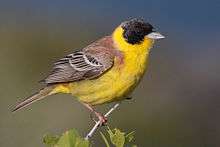bunting
See also: Bunting
English
Etymology 1
.jpg)
Bunting on display for day 3 of the 2012 Olympic torch relay, in Devon, UK
Possibly from dialect bunting (“sifting flour”), from Middle English bonten (“to sift”), hence the material used for that purpose. Possibly from Germanic bundt (“to bind or tie together”).
Noun
bunting (countable and uncountable, plural buntings)
Translations
strips of material hung as decoration
material from which flags are made
|
|
flags as a group
|
Etymology 2

A black-headed bunting (Emberiza melanocephala)
[From circa 1300], from bountyng, of unknown origin. Possibly from buntin (“plump”) (compare baby bunting, Scots buntin (“short and thick”), Welsh bontin (“rump”) and bontinog (“big-arsed”)), or a double diminutive of French bon. Or possibly a reference to speckled plumage, from an unrecorded Old English word akin to German bunt (“multi-coloured”), Dutch bont.[1]
Noun
bunting (plural buntings)
Derived terms
Translations
bird
Etymology 3
Noun
bunting (countable and uncountable, plural buntings)
References
- “bunting” in Douglas Harper, Online Etymology Dictionary, 2001–2019.
This article is issued from
Wiktionary.
The text is licensed under Creative
Commons - Attribution - Sharealike.
Additional terms may apply for the media files.